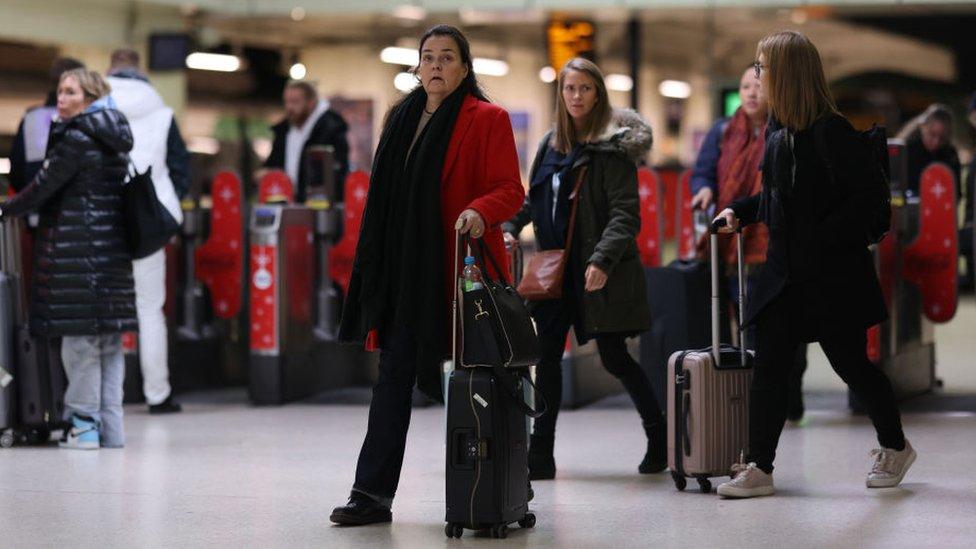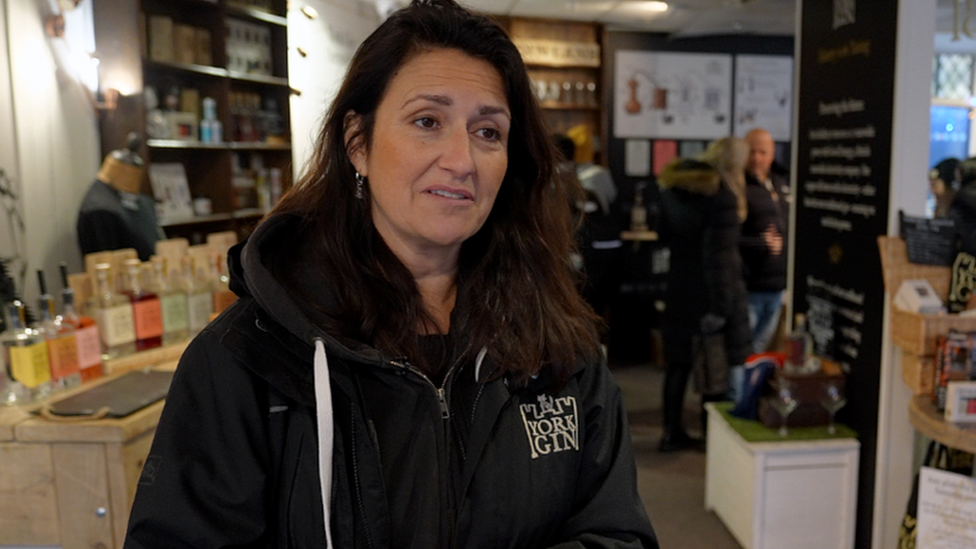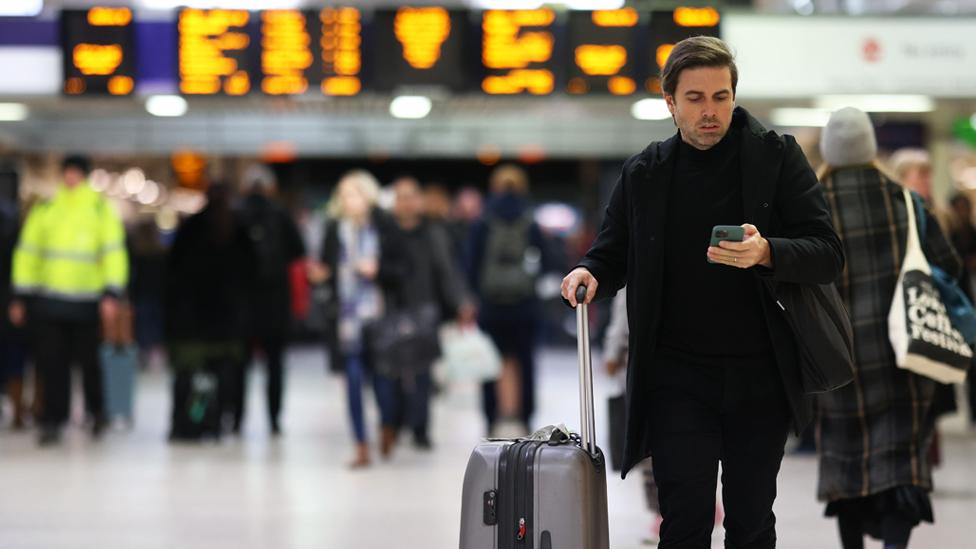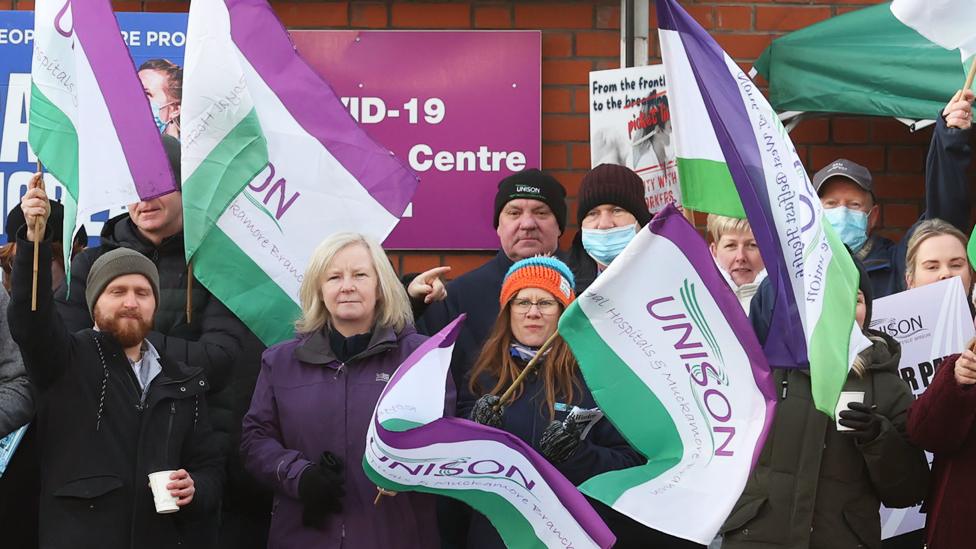Train strikes: Widespread delays as latest walkouts begin
- Published

Most train companies are likely to be affected, and Network Rail advises to "only travel if absolutely necessary"
Train passengers are braced for major disruption this week, as a series of strikes is set to bring the UK's rail network to a standstill.
About 40,000 rail workers are walking out on Tuesday, Wednesday, Friday and Saturday as part of a long-running row over jobs, pay and conditions.
It comes after members of the UK's biggest rail union, the RMT, rejected fresh pay offers and vowed to fight on.
But the government says it will not back down, despite the "damage" done.
Most train companies across Britain are likely to be affected, and Network Rail has urged passengers to "only travel if absolutely necessary".
Travellers are advised to check their train-operating company's website before setting out, with delays and cancellations also likely on the days around the strikes.
There are likely to be no services early in the morning or late at night, with only one in five services operating between 07:30 - 18:30 GMT.
The RMT has held a series of strikes since the summer that have shut much of the rail network in England, Scotland and Wales and threaten to hit businesses in the run-up to Christmas.
It comes as workers in many other industries down tools, with bus drivers, Royal Mail workers, nurses and highways workers and baggage handlers also striking this week.
Rail workers are calling for better conditions and pay rises to match the pace of inflation, with the cost of living rising at its fastest rate for more than 40 years.
But the government has ruled out inflation-linked wage increases, and rail bosses say big changes are needed to modernise the railway.
On Monday, Network Rail, which operates the UK's rail infrastructure, said the union was causing "misery" after its members rejected a fresh pay deal.
The Transport Secretary Mark Harper meanwhile said that the strikes by rail workers will be "very damaging".
Mr Harper told the BBC he was "very disappointed" that the RMT had rejected the latest pay offer "out of hand" and that isn't "a bottomless pot" of money.
"A fair and reasonable offer has been made, we do also need to see reform agreed at the same time," he added.
But Mr Lynch said the government was doing nothing to stop the walkouts and effectively wanted to ban such action with tough new anti-strike laws.
"Our members, along with the entire trade union movement will continue their campaign for a square deal for workers, decent pay increases and good working conditions," he said.

Emma Godivala, who runs the York Gin distillery, said the strikes were hitting her business ahead of the vital Christmas trading period.
The company has closed one of its shops in York railway station as they didn't think there would be any customers, and bookings for tasting events this week have been cancelled too.
"Lots of independent traders make most of their trade at Christmas time, so it's having a disproportionately large effect because of the time of year," she told the BBC.
Sarah Czarnecki, vice chair of the Hospitality Association York, said some hotels in the city had seen bookings, conferences and meetings cancelled "because of the nervousness around getting here and getting back".
"This happening in the week before Christmas is obviously going to hurt because everybody's trying to bolster their bank balance in order to deal with the first quarter of next year," she said.

The RMT is involved in two negotiating battles, one with Network Rail, where it represents around 20,000 signallers and maintenance workers, and the other with the Rail Delivery Group (RDG), where it represents about 20,000 workers at 14 train companies.
Last week, the union rejected an offer from the Rail Delivery Group which would allow for a 4% pay rise this year and another 4% next year, arguing it did not meet its criteria for pay or conditions.
Among other changes it would have seen ticket offices closed or repurposed, more Sunday working and greater use of part-time contracts.
But Mr Lynch said it would mean "the loss of thousands of jobs" and the use of "unsafe practices".
Meanwhile, 63.6% of RMT members at Network Rail who voted rejected a deal on Monday that would have given them a 5% pay rise this year and a 4% rise in 2023.
The union said the offer was "substandard" and depended on big changes to working practices, as well as 1,900 job losses, although Network Rail insisted the cuts could be achieved voluntarily.
After this week's walkouts, RMT members at both groups will strike again on 3-4 January and 6-7 January.
In addition, members at Network Rail will go on strike from 18:30 on Christmas Eve until 06:00 on 27 December.
Mr Lynch has called on the prime minister to meet him to attempt to resolve the dispute.
But on Monday Rishi Sunak's official spokesman said: "We are not seeking to impose government over and above either the independent pay review process or ongoing discussions between employers and the unions.
"We won't be changing the process."
On Monday, ministers discussed contingency plans for upcoming strikes, including using the military and civil servants to cover Border Force staff, at an emergency Cobra meeting.
The armed forces will also be deployed to hospital trusts ahead of an ambulance strike, the government says.
But Downing Street warned there would still be serious disruption and added that the country is facing "a challenging number of days".


How are you affected by the rail strike? Are you taking part in the strike action? You can email: haveyoursay@bbc.co.uk, external.
Please include a contact number if you are willing to speak to a BBC journalist. You can also get in touch in the following ways:
WhatsApp: +44 7756 165803, external
Tweet: @BBC_HaveYourSay, external
Or fill out the form below
Please read our terms & conditions and privacy policy
If you are reading this page and can't see the form you will need to visit the mobile version of the BBC website to submit your question or comment or you can email us at HaveYourSay@bbc.co.uk, external. Please include your name, age and location with any submission.
Related topics
- Published12 December 2022

- Published12 December 2022

- Published9 May 2024
